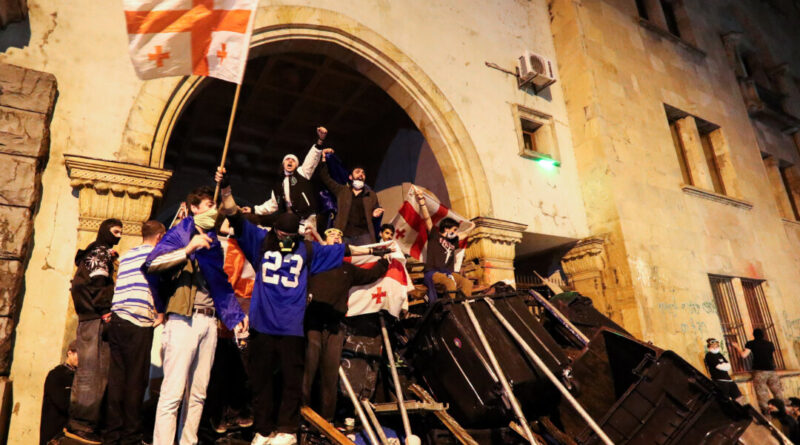Georgia Launches Investigation into Suspected Murder Conspiracy Targeting Party Leader
Alleged plot follows Georgia’s adoption of controversial legislation aimed at curtailing perceived foreign influence.
Georgian authorities have opened an investigation into an alleged plot to assassinate Bidzina Ivanishvili, founder of the ruling Georgian Dream party, and “violently overthrow” the government.
In a July 24 statement, Georgia’s state security service said it was investigating alleged “criminal activities,” including a “plot to assassinate” Mr. Ivanishvili.
It further alleged that the plot was directed by “former senior Georgian officials and law enforcement officers currently residing in Ukraine.”
According to the security agency, the plot’s ultimate aim was the “violent overthrow” of the current government, led by Georgian Dream and its parliamentary allies.
It didn’t name the alleged plotters.
According to local media, at least six people—including some who reportedly fought Russian forces in Ukraine—have been summoned for questioning.
The Epoch Times couldn’t independently verify the claims.
The U.S. State Department didn’t respond to The Epoch Times’ request for comment on the allegations by publication time.
A small country in the South Caucasus region, Georgia has voiced opposition to Russia’s ongoing invasion of eastern Ukraine, now in its third year. However, Georgia has declined to impose Western sanctions on Russia, and the current government maintains relatively good relations with Moscow.
‘Foreign Agents’ Law Fallout
Claims of a plot against Georgia’s leadership follow the country’s recent adoption of a controversial law aimed at curtailing perceived foreign influence.
In May, Georgia’s parliament ratified the law, which requires organizations that receive overseas funding to register as “organizations pursuing foreign interests.”
Proponents of the law, which was championed by the ruling party, say it is needed to protect the country from malign foreign influences operating under the guise of “civil society.”
They also say it’s needed to safeguard Georgia’s national sovereignty and combat “pseudo-liberal values” imposed by foreign—especially Western—entities.
Opponents of the law, however, say it will stifle free expression and impede Georgia’s chances of joining the European Union (EU), which granted the country candidate status last year.

In the weeks leading up to the law’s adoption, opponents of the legislation staged several large demonstrations—occasionally clashing with police—in Georgia’s capital, Tbilisi.
Meanwhile, several Western institutions and countries—including the EU, the United States, the UK, and France—urged Georgia to scrap the legislation.
In mid-May, Josep Borrell, the EU’s foreign policy chief, warned that the law’s ratification would negatively affect Georgia’s EU membership bid.
The law’s critics, both domestic and foreign, call it the “Russian law,” comparing it to legislation allegedly used by Moscow to suppress political dissent.
Moscow denies any association with Georgia’s “foreign agents” law or its recent ratification by the country’s parliament. Following the law’s adoption, Washington imposed visa restrictions on Georgian ruling party officials who, it claimed, were “complicit in undermining democracy.”
In early June, Washington unveiled a “first tranche” of restrictions targeting ruling party officials, parliamentarians, police officers, and some private individuals.
“This is just the first step in our series of actions,” State Department spokesman Matthew Miller said at the time.
Washington, he added, is also “undertaking a full review” of its relationship with the government of Georgia.
Mr. Miller went on to voice hope that Georgia would “reconsider” the law “and take steps to move forward with [its] long-stated democratic and Euro-Atlantic aspirations.”
“If they do not, the United States is prepared to take additional actions,” he said.
Soon afterward, the Pentagon announced the cancellation of joint drills between the United States and Georgian militaries, initially slated for early June.
At the time, Thea Tsulukiani, Georgia’s deputy prime minister, described the punitive measures as “another mistake the United States is making in its relations with a strategic partner.”

Prior Coup Claims
Last year, a similar effort by Georgian Dream to adopt legislation against foreign influence was scrapped after several days of street protests in Tbilisi.
At the time, Russia’s foreign ministry claimed that the protests were being directed from overseas, comparing them to Ukraine’s “Maidan Revolution” a decade ago.
According to Moscow, the 2014 uprising in Kyiv, which swept Ukraine’s pro-Russia president from power, was a U.S.-backed “coup” against an elected leader.
Washington, however, rejects the claim, saying the uprising reflected the will of the Ukrainian people and their democratic aspirations.
Moscow made similar claims last month after Georgia’s “foreign agents” law was finally adopted by Parliament.
“We can see attempts by the Westerners to escalate the situation in Georgia ahead of the parliamentary elections set for October,” Mikhail Galuzin, Russia’s deputy foreign minister, said in remarks carried by Russian state media in early June.
“We don’t rule out that the goal is to try to implement a ’maidan-like’ scenario for a change of government in order to create another hotbed of tensions near Russia’s border.”
The State Department quickly dismissed the claims as “Russian disinformation.”
“We have seen the Russian government use disinformation to spread lies and rumors across Europe and across the world,” Mr. Miller told reporters on June 4.
Georgian Prime Minister Irakli Kobakhidze said at a July 24 press conference: “Much has gone wrong in our relations over the past three to four years, and it’s time for a fresh start. … Georgian–American relations need a reboot.”
Washington hadn’t responded to Mr. Kobakhidze’s appeal as of publication time.
Reuters contributed to this report.





